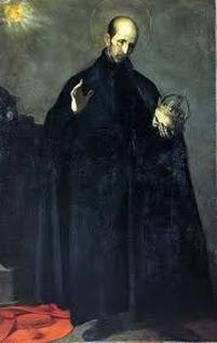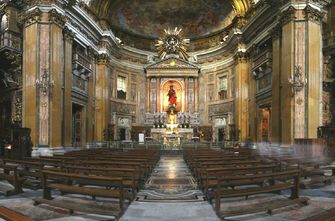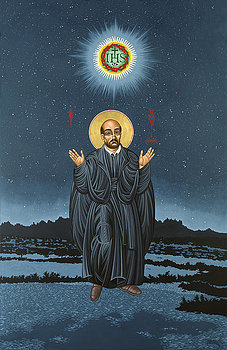 This month is an important one in the history of the Society of Jesus, (commonly known as the Jesuits.) On October 2, 2016 they began General Congregation 36, a convening of Jesuits representing every country and province where they have a presence, to discern the direction of the Society and to elect a new Father General who will be the 30th successor to St. Ignatius Loyola, founder of the Jesuits. This new Father General will take up the mantle as spiritual and organizational leader for the thousands of Jesuits in the Society, and the prayerful decisions made at the General Congregation will affect the ministry of Jesuits to millions of people all over the world. In honor of this occasion I would like to highlight St. Francis Borgia, SJ, whose feast day is on October 3. He was the third Father General of the Society of Jesus and is regarded historically as a second founder because of the reforms he secured for the young order during the time of his leadership. St. Francis Borgia was a truly remarkable man, known for demonstrating heroic virtue, referred to in his native Spain as “the holy duke” even before he became a Jesuit. St. Francis Borgia was born in Valencia, Spain, on October 28, 1510. His father was the third duke of Gandía and consequently both his parents were related to people of stature and wealth from various parts of Europe. At the age of 19 he married Leonore de Castro and they had eight children over the course of the next ten years. Francis was in the service of the king and queen, but when the queen died unexpectedly in 1539, he began to experience a conversion to a much deeper spiritual life. His father died in 1543, and so Francis became the fourth duke of Gandía. He continued to function in various prestigious roles until his wife passed away in 1546, at which point he retired completely from courtly service hoping to pursue a religious life. He already knew St. Peter Favre, SJ, and he had also previously founded a Jesuit college in Gandía, so it seems natural that Francis pursued life as a Jesuit himself.  During a retreat directed by the rector of the college, Francis discerned that he was indeed called to religious life, so he resigned his title, entering the Jesuits in 1551. In 1565, only nine years after St. Ignatius’ death, Francis became the third Father General of the Jesuits. He spent seven years in leadership, “revising the Society’s rules, overseeing its expansion, promoting missions in India, North and South America, and in reading and writing countless letters…. [He] began, the Gesù church in Rome as well as the novitiate of Sant’ Andrea,” (also in Rome).* In short, St. Francis Borgia promoted the growth of the Society of Jesus through its early years, adding reforms as they arose, taking the hopes, dreams and desires of St. Ignatius, under the guidance of the Holy Spirit through his prayer and discernment, and labored tirelessly to promote the work which the original Jesuits began: forming schools, giving retreats, doing missionary work, helping the poor, working for justice, and other important works of service to help anyone who was in need. St. Francis Borgia had a vast array of lived experience: he had been married, a father, widowed, and had also possessed great material wealth and position. Yet when the opportunity arose he chose to live in religious life with vows of chastity, obedience, and poverty. Francis did not become holy overnight or upon his entrance into the Jesuits. Rather, his holiness grew over the course of his life; despite his lofty pedigree he served humbly and continuously from his courtly life throughout his life as a Jesuit, including his time as Father General. It was such a part of his character that one could make an argument that even his death resulted from his humble service. When the pope requested that Francis return to Spain to secure the Jesuits' help against the Turks, he acquiesced although his preference was not to go. While in Spain he was welcomed as ‘the holy duke,’ especially by the people of Barcelona where he had been viceroy many years previously. He served as requested, but this trip weakened his health and he died a few years later (in 1572), having exhausted himself completely in the service of God.  What comes clear in reflecting upon the life and service of St. Francis Borgia is that he was regarded highly from the time he was a young man serving in courtly life to the time of his death. He grew with the grace given him, especially evident in the virtue of humility he cultivated, which rather than being forgotten among the titles and trappings, increased so that he could act upon his call to serve as a Jesuit priest. Therefore, one of the important lessons he teaches us is that no matter what vocation we are living, the call to discipleship is to be a man or woman of God, giving humble service just as Jesus taught. On the night on which Jesus died, He made it clear that we are to serve one another when He took off His outer garment and washed the feet of His disciples. (John 13:1-17) Similarly, He taught on many occasions that the greatest is the servant of others, (Matthew 20:26-27 and Mark 9:35, for example.) St. Francis Borgia certainly took this teaching to heart. But he also modeled for us the wisdom of being patient and exercising the gift of discernment so that in our life choices we proceed according to the way the Lord guides us.  One of the mistakes people sometimes make, often out of good intention, is to fail to ‘notice’ the vocation they are in, all the while pining for something new and different. Even when the call to something new is real and from the Holy Spirit, we cannot move until the time is right. We can learn a lot from ‘the holy duke:’ we learn that we are to live every day where we are, serving in the present situation, not the one we think we might be in tomorrow. It is impossible to be anywhere but where we are now; we only possess the power to be attentive to the things of today. In the Gospel Jesus said: “Do not worry about tomorrow; tomorrow will take care of itself. Sufficient for a day is its own evil.” (Matthew 6:34 specifically, but the entire context is Matthew 6:19-34) Jesus is warning us that every day has struggles as well as opportunities for growth, service, mercy, and love. Therefore, we need to attend to today before becoming distracted by tomorrow. That is not to say we should never plan or look ahead, but rather we should beware of becoming absorbed in tomorrow when we do not know what today will bring, thereby missing the call appropriate to the people and situations before us now. In fact, it can actually become a temptation which could cause us to become less effective today because we are not truly paying attention to the movements of the Spirit at this moment. It seems that even in his life before becoming a Jesuit priest St. Francis Borgia understood this truth and so he lived a virtuous life as a marquis, viceroy, and duke. His call during that period of his life had been to serve God as a fair and just leader to his people. But when the time became appropriate, after discernment and prayer, he made the decision to change his lifestyle so as to continue to say ‘yes’ to God. As a Jesuit he served by ministering first as a simple parish priest, then going wherever he was sent by his superiors, always seeking to bring the lost back to God and to help those who were already believers to grow in their faith. When he was the Father General of the Jesuits, he reminded his brother Jesuits to do all for the glory of God, but also to embrace the suffering of the cross so that they would maintain their humility.  While there are many saints, St. Francis Borgia is one in whom we can all find something to which we can relate given that he lived a significant portion of his life as a layperson, (married man, parent, and civic leader of many), and later as a priest and head of the Jesuits. Throughout his entire life, he sought to live the vocation to which he was called at the time, being faithful to the gifts he was given, putting them at the service of his countrymen and always of God. I am sure there will be much written about the 36th General Congregation of the Society of Jesus, but what is important for each of us is that like St. Francis Borgia, we continue to discern our call from God that we might become holier and that we might help make Jesus known and loved in our respective vocation. We can learn to be attentive, to see and hear the call of God to serve His people right where we are. And we can call upon ‘the holy duke,’ St. Francis Borgia, to intercede for us that we might grow in the gift of discernment. May we pray for the success of the mission of the Society of Jesus as they move into the future! May we imitate the life of St. Francis Borgia, striving to follow the movements of the Holy Spirit each day! May we develop the gifts of discernment and prayerful attentiveness to God’s daily call to us! May we desire to make Jesus known and loved through our word and deed! May we grow in humility and service of God, learning from the gospel of Jesus! And may we be willing to follow Jesus as true disciples, promoting justice and peace through mercy, compassion, and love! Let us continue to meet in the heart of Jesus! Peace! ©Michele L. Catanese Next post: October 22. (Note that it will be posted earlier than usual, on a Saturday.) * The quote is from page 333 of Jesuit Saints and Martyrs by Joseph N. Tylenda, SJ Loyola Press, 1998. I also used the following as resources in researching the life of St. Francis Borgia, SJ,: - https://www.catholicculture.org/culture/library/view.cfm?recnum=9996 - http://www.ignatianspirituality.com/ignatian-voices/16th-and-17th-century-ignatian-voices/st-francis-borgia-sj - https://en.wikipedia.org/wiki/Francis_Borgia,_4th_Duke_of_Gand%C3%ADa - https://archive.org/details/SpiritualWorksOfStFrancisBorgia Also, concerning the General Congregation click here: http://www.gc36.org/ Images: The first image is a painting of St. Francis Borgia. I cannot find the credit for the artist of this painting. But I chose the painting because it depicts St. Francis Borgia holding a crown atop a skull. This is symbolic of his earthly position and the reminder of his humility: the earthly titles and honors are fleeting, but rather he aspired to a life in heaven with God which is eternal. He is clearly wearing his priestly cassock, and looks like any other priest, even though he was the Father General. Indeed he was a man of humility. Next is a photo of the Gesù in Rome, the magnificent Jesuit church begun by Francis Borgia, (as mentioned above in the quote by Joseph Tylenda, SJ.) Attached to the church is the apartment that was inhabited by St. Ignatius during his life and it contains many artifacts from Ignatius and the early Jesuits. The next two photos are mine. The first of them was taken in the tiny country of Liechtenstein. You can see the castle which is still occupied by the family of the prince and behind it are the majestic Alps. While this is obviously not Italy or anywhere that St. Francis Borgia was, to my knowledge at least, I chose this photo because it seemed to capture the humility of both the civil aspect and the religious aspect of the service of Francis. The castle seems to signify earthly positions, but the Alps which surround the castle put his role into perspective: his call to serve as a Jesuit was always in the context of humility and the service of our great and mighty God. The second of my photos is of a loon swimming in Jordan Pond in Acadia National Park, Maine. The photo seems to highlight the loon, but there is much to notice in the frame: the marsh grass, the clarity of the water, the way the light plays on the surface of the pond, the configuration of the rocks, the reflections, etc. I chose this precisely because the loon is a bit occluded by the grass. One has to look intently to see that it is indeed a loon and not a duck or some other water fowl. Finally I chose to close with an icon by Fr. William Hart McNichols called St. Ignatius in Prayer Beneath the Stars. I have always loved this icon because St. Ignatius, the founder of the Jesuits, seems to be floating about the rock. St. Ignatius had many mystical experiences, but like many who followed him as Jesuits or those who follow in his spirituality as lay people, he had to grow into holiness and humility in some rather dramatic ways. Like his eventual successor, St. Francis Borgia, he had come from courtly life and grew into the call which was presented to him by God. If you wish to obtain a copy in one of many formats, you can find the icon at http://fineartamerica.com/featured/st-ignatius-in-prayer-beneath-the-stars-137-william-hart-mcnichols.html Comments are closed.
|
Heart Speaks to Heart
|

 RSS Feed
RSS Feed

